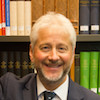On American Anti-Slavery Literature: With Visiting Scholar Lawrence Goldman
01/01/1970
“Arbitrary.” “Reversal.” “Liable at every moment…to these frightful and unnecessary calamities.” The vocabulary of the quotations with which Fall 2018 Distinguished Research Fellow Lawrence Goldman began his September 13 colloquium—quotations drawn from the narratives of former slaves Harriet Jacobs, Henry Bibb, and Josiah Henson—all spoke to a condition at the heart of his talk: the mutability and precariousness of slave life; the position of being ‘at every moment’ at the mercy of events and actions beyond one’s own control.
Throughout his lecture, however, Prof. Goldman placed the slave’s being always subject to chance in conversation with an inverse condition emerging both in Jacksonian America and in early-Victorian England: the increased predictability of bourgeois life. Rooted, at least in large part, in the rise of free contracts—as well as respect for their enforcement—this newfound stability took various forms. On both sides of the Atlantic, this era saw the development of institutions, such as well-capitalized banks and insurance companies, geared at taming risk (a phenomenon that, as seen in the paintings of Thomas Cole, likewise extended to efforts to tame the environment itself). It was also an era in which social science and data collection became prominent mechanisms for asserting some predictive control over life events. The common denominator was a spirit of functional rationalization that Prof. Goldman traced into the 20th-century work of Max Weber and that afforded members of the antebellum bourgeoisie a capacity for self-possession—i.e., a capacity to rationally calculate, independently determine, and freely pursue their own best interests.
And this was a development, Prof. Goldman continued, that had a profound impact on bourgeois understanding of slavery and, in turn, on the rhetoric of both the anti-slavery movement and anti-slavery literature. As he described, a recognition of the contrast between the order of their own lives and the cruel, unpredictable, and despotic power to which slaves were subject led leading anti-slavery figures like Angelina Grimké and Theodore Weld to pursue what they saw as the intertwined higher callings of self-denial and abolitionism. In terms of the world of anti-slavery literature, one person, Harriet Beecher Stowe, stood head-and-shoulders above contemporaries in the detail, sentiment, and clarity with which she represented not only the precariousness of the lives of slaves, but the brutality and inhumanity with which precariousness was manifested. In a theme common to the anti-slavery genre as a whole, Stowe focused in Uncle Tom’s Cabin (and elsewhere) on the family unit as particularly insecure, subject to violent fracture based entirely on the changing fortunes, conditions, and concerns of the lives of slave owners. And this contrast between order and disorder—between arbitrary misfortune and being arbiter of one’s fortune—would ultimately come to define how emancipation was conceived: both as a freedom from risk and a freedom of rational self-possession.
 Lawrence Goldman was born in London and graduated in History from the University of Cambridge (Jesus College). He studied American History at Yale as a Harkness Fellow and returned to Britain to do his doctoral work at Cambridge’s Trinity College, focusing on the history of social science in the Victorian period. He spent 29 years as a university lecturer at the University of Oxford where he was Fellow and Tutor in History at St. Peter’s College and where he taught modern British and American History. He was then Director of the Institute of Historical Research in the University of London. From 2004-2014 he was the Editor of the Oxford Dictionary of National Biography, a compendium of the most significant figures throughout British history and the longest work in the history of the English language, and he has authored books on Victorian social science, the history of workers’ education in Britain, and the life of political thinker and historian R.H. Tawney, among other topics. He is a Senior Research Fellow of St. Peter’s College and joins the Kinder Institute as a Fall 2018 Distinguished Research Fellow.
Lawrence Goldman was born in London and graduated in History from the University of Cambridge (Jesus College). He studied American History at Yale as a Harkness Fellow and returned to Britain to do his doctoral work at Cambridge’s Trinity College, focusing on the history of social science in the Victorian period. He spent 29 years as a university lecturer at the University of Oxford where he was Fellow and Tutor in History at St. Peter’s College and where he taught modern British and American History. He was then Director of the Institute of Historical Research in the University of London. From 2004-2014 he was the Editor of the Oxford Dictionary of National Biography, a compendium of the most significant figures throughout British history and the longest work in the history of the English language, and he has authored books on Victorian social science, the history of workers’ education in Britain, and the life of political thinker and historian R.H. Tawney, among other topics. He is a Senior Research Fellow of St. Peter’s College and joins the Kinder Institute as a Fall 2018 Distinguished Research Fellow.
FEATURED EVENTS
10/14/2025
09/21/2025
09/26/2025
07/22/2025
